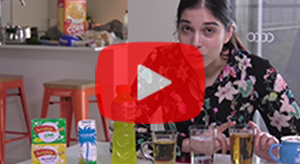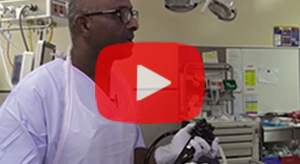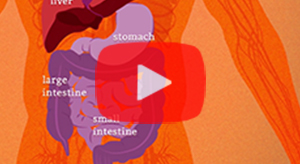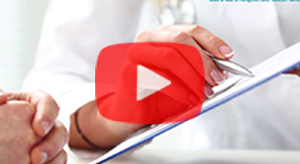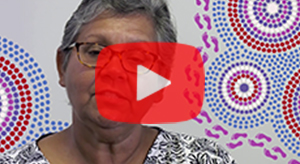Gastroenterology and Hepatology
(oesophagus, stomach, intestine/colon, pancreas, biliary tree and liver)
We provide care and treatment for people with gastrointestinal (gut) and liver conditions including:
- Crohn’s Disease and ulcerative colitis (inflammatory bowel diseases)
- Cirrhosis (chronic scarring of the liver)
- Irritable bowel syndrome (non-inflammatory conditions of the gut)
- Disorders of the pancreas and bile ducts
- Intestinal insufficiency/failure.
Our services
We offer a wide range of services including:
- care for critically ill patients needing hospital treatment
- outpatient clinics
- endoscopy and related procedures (for investigation, diagnosis and treatment of disorders affecting the digestive system and the bile ducts)
- medical management of liver diseases
- medical management of Crohn’s disease and ulcerative colitis
- medical management of acute or chronic intestinal insufficiency/failure.
View these colonoscopy and endoscopy educational videos to learn more about the procedures. It is important that you follow the instructions give by the RBWH Endoscopy department as your circumstances may be different from the general information supplied in these videos.
Information in your language
These videos are captioned in other languages. Click the CC button to view the captions. Available languages are: Chinese Simplified (简体中文), Chinese Traditional (繁體中文), Hindi (हिंदी), Korean (한국인), Punjabi (ਪੰਜਾਬੀ), Spanish (Español).
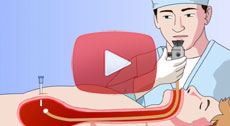
Introduction to Gastrostomy Tubes: Making the decision
This video will enable you and your family to make an informed decision about gastrostomy tubes and participate in your treatment plan. It includes information on gastrostomy tubes and how they are inserted. It allso includes a demonstation on how the gastrostomy tube is used to provide nutrition, as well as the experience of some of our patients.
How to access this service
To access this service, your GP or medical practitioner will need to send a referral letter to the hospital.
If there is a waiting list, you will receive a confirmation letter and be advised on what to do next. If there is no waiting list, you will receive an appointment booking letter or we will contact you to arrange a suitable time for your appointment.
Refer a patient
To refer a patient:
Gastroenterology referral guideline
GP and Specialist Hotline:
1300 364 938
Health professionals:
More information
After your hospital appointment
Your doctor may advise that you require surgery. If this is the case you will be placed on a surgical waiting list and may need to attend the Pre-admission Clinic before your surgery.
What to bring
Each time you visit us
- Your Medicare card
- Private health insurance card (if you have one)
- Health Care Card and/or concession card (if you have one)
- Current medications (prescription, over the counter and herbal medicine)
- Relevant x-rays, scans or any other test results or reports
- Glasses, hearing and mobility aids
For an outpatient or clinic appointment
- Your appointment letter
- Any special items listed on your letter
- WorkCover claim number (if relevant)
- Snacks, a drink or money to buy refreshments
- Something to read or do while you wait
For a day procedure
- An adult carer to support you and take you home
- Copy of Advanced Healthcare Directive or Enduring Power of Attorney (if you have one)
- A jacket or cardigan in case you get cold
Staying overnight or longer
- A dressing gown or cardigan, sleepwear or comfortable day clothes
- Slippers and shoes (low heel, closed-in, non-slip, adjustable and firm fitting around the foot)
- Your toiletries and personal items
- Copy of Advanced Healthcare Directive or Enduring Power of Attorney if you have one
- Something to read or do during your stay
- A smart phone, tablet or laptop, connecting earphones and chargers so you can connect to the free MetroNorth-PatientWiFi and access entertainment. Televisions may not be available for use.
- Medical devices required for your care (e.g. CPAP machine)
- Do not bring large amounts of cash or valuables such as jewellery, watches or other items of value to you
Before your surgical procedure
Do you need an interpreter?
Our doctors and nurses may need to ask you questions about your health. It is important that you and the doctor or nurse understand each other. Please let us know if you need an interpreter at least 48 hours before your appointment.
How to prepare
- If you are having a general anaesthetic, you will need to provide the name and number of a responsible adult who can collect you after your appointment. You can expect to be in the unit for about 3-4 hours.
- You will also need to ensure arrangements have been made for a responsible adult to remain with you overnight.
- Please ensure all pre-procedure instructions are followed (e.g. fasting is when you consume no food or drinks including water. This also includes chewing gum and lollies).
- Please seek advice from your doctor if you are diabetic, take warfarin or any other blood thinning medication. Do not stop taking this medication unless advised to do so.
- Do not drink alcohol, avoid smoking and stop recreational drugs 24 hours before the procedure.
Clinics
Contact us
Location: Level 9, Gastroenterology Department
Phone: (07) 3646 7891
Email: RBWH-Gastro-Admin
Open: Monday-Friday 8.00am-4.00pm
Need help outside hours?
For non-urgent medical issues call 13 HEALTH (13 43 25 84) or visit your GP.
In an emergency call 000.
Refer a patient
To refer a patient, view the Gastroenterology referral guideline.
GP and specialist referral hotline:
1300 364 938
Resources
Procedure information sheets
- About your anaesthetic
- Capsule Endoscopy
- Colonoscopy
- Endoscopic Ultrasound and Fine Needle Biopsy
- Enteroscopy
- ERCP (Gastroendoscopy)
- Percutaneous Endoscopic Gastrostomy (PEG) Tube
- Sigmoidoscopy (flexible)
- Upper Gastrointestinal Endoscopy
- Upper Gastrointestinal Endoscopy for Bleeding
- Upper Gastrointestinal Endoscopy & Dilatation
- Upper Gastrointestinal Endoscopy & Variceal Banding
- Upper endoscopy and colonoscopy educational videos
Health professionals
The Gastroenterology and Hepatology Department at RBWH is an internationally acclaimed centre of clinical excellence. It is the largest specialist unit for patients with gut and liver problems in Queensland. Our service takes referrals from the local area of north Brisbane, south east Queensland and more complex problems from across the state.
We offer the following services:
- Endoscopy and colonoscopy including an extensive surveillance program for patients with Barrett’s oesophagus, colonic polyps and those with a family history of bowel cancer.
- Advanced endoscopy including ERCP, capsule endoscopy and small bowel enteroscopy.
- Management of liver diseases including specialist liver outpatient clinics (RBWH and North Lakes), multidisciplinary care for patients with chronic liver disease, a liver cancer surveillance program and a clinical trials program.
- Management of Crohn’s disease and ulcerative colitis. This program includes multiple dedicated clinics at RBWH and North Lakes, a weekly telehealth program for patients living in the Wide Bay (Bundaberg) and Central Queensland regions (Rockhampton), a colonoscopy surveillance program and a clinical trials program.
- Management of intestinal failure. This service covers most of the state, providing nutritional support for patients with nutritional compromise and either partial or complete intestinal failure. This includes education and training for patients who require home parenteral nutrition or enteral nutrition.


